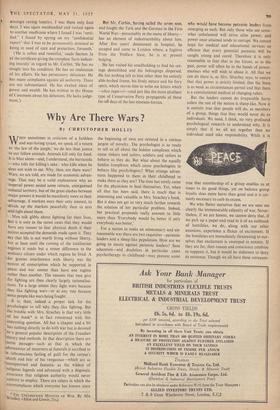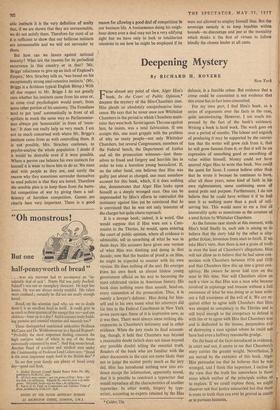Why Are There Wars?
By CHRISTOPHER HOLLIS
WHEN sometimes in criticism of a faithless and war-loving tyrant, we speak of a• return to 'the law of the jungle,' we do less than justice to our fellow animals. Animals kill only for food. It is Man alone—and, I understand, the barracuda —who kills for killing's sake: who kills when he does not wish to eat. Why, then, are there wars'? Wars, we are told, are made for economic advan- tage. That may be a valid explanation why an imperial power seized some remote, unorganised colonial territory, but of the great clashes between major powers it would be manifestly more to their advantage, if markets were their only interest, to divide up the markets peacefully than to arm and tight about them..
Men talk glibly about fighting for their lives, but it is only in the rarest cases that they would have any reason to fear physical death if their nation accepted the demands made upon it. They say that life is not worth living without liberty, but at least until the coming of the totalitarian regimes it made but a minor difference to the ordinary citizen under which regime he lived. A far greater interference with liberty was the .system of conscription which he supported in peace and war sooner than have one regime rather than another. The reasons that men give for fighting are then clearly largely rationalisa- tions. To a large extent they fight wars because they like fighting wars—or at any rate because some people like wars being fought.
It is, then, indeed a proper task for the Psychologist to tell w,hy they like fighting. But the trduble with Mrs. Strachey is that very little of her book* is in fact concerned with this interesting question. All but a chapter and a bit has nothing directly to do with war but is devoted to a general popular description of the Freudian 3itheory and methods. In that description there are ‘tsome passages—such as that in which the '!demeanour of mourners at funerals is ascribed to %i subconscious feeling of guilt for the corpse's .14:leath and fear of his vengeance—which are as 'flIrlsupported and fantastic as the wildest of religious legends and advanced with a dogmatic assurance that religious authority would never venture to employ. There are others in which the commonplaces which everyone has ,known since * THE UNCONSCIOUS MOTIVES OF WAR. By Alix Strachey. (Allen and Unwin, 25s.) the beginning of time are restated in a curious jargon of novelty. The psychologist is so ready to tell us all about the hidden complexes which cause tinkers and tailors, soldiers and sailors to behave as they do. But what about the equally hidden 'complexes which cause psychologists to behave like psychologists? What strange adven- tures happened to them in their childhood to make them as they are? The time has surely come for the physicians to heal themselves. Yet, when all that has been said, there is much that is interesting and valuable in Mrs. Strachey's book. But it does not get us very much farther towards the solution of her particular problem. Indeed, her practical proposals really amount to little more than 'Everybody would be better if only everybody was better.'
For a nation to make an unnecessary and un- reasonable war there are two requisites—paranoic leaders and a sheep-like population. How are we going to insure against paranoic leaders? Sane education—and doubtless in particular cases psychotherapy in childhood—may prevent some who would have become paranoic leaders from emerging as such. But only those who are some- what unbalanced will strive after power, and power once attained tends to corrupt. We cannot hope for medical and educational services so efficient that every potential paranoic will be caught young and cured. Therefore it is only reasonable to fear that in the future, as in the past, power will often be in the hands of power- maniacs who will wish to abuse it. All that we can do there is, as Mrs. Strachey says, to ensure that that power is strictly limited, that the State is as weak as circumstances permit and that there is a constitutional method of changing rulers.
But the leaders cannot do irreparable harm unless the rest of the nation is sheep-like. Now it is entirely true that people will do, as members of a group, things that they would never do as individuals. We need, 1 think, no very profound psychological research to understand why. It is simply that if we all act together then no individual need take responsibility. While it is true that membership of a group enables us at times to do good things, yet on balance group loyalty does more harm than good and it is cer- tainly necessary to curb its excess.
We who flatter ourselves that we are sane see clearly the immeasurable calamity of war. Never- theless, if we are honest, we cannot deny that, if we pick up a paper and read in it of an outbreak of hostilities, we do, along with our other emotions, experience a flicker of excitement. If the hostilities are immediately threatening to our- selves that excitement is swamped in anxiety. If they are far, then reason and conscience combine to suppress it, but it would be dishonest to deny its existence. Though we all have these unreason- able instincts it is the very definition of sanity that, if we are shown that they are unreasonable, we do not satisfy them. Therefore for most of us it is sufficient to show that our bellicose instincts are unreasonable and we will not surrender to them.
But how can we insure against national insanity? What are the reasons for its periodical recurrence in this country or in that? `Mr. Briggs' reluctance to give up an inch of England's Empire,' Mrs. Strachey tells us, 'was based on his exceptionally strong anal-retentive instincts.' (Mr. Briggs is a fictitious typical English Blimp.) With all due respect to Mr. Briggs I do not greatly care whether his instincts came from his anus or, as some rival psychologists would assert, from some other portion of his anatomy. The Freudians tend to put 'anal' automatically in front of all • epithets in much the same way as Parliamentar- ians always put 'honourable' in front of 'mem- ber.' It does not really help us very much. I am not so much concerned with where Mr. Briggs's instincts came from as with controlling them. It is not possible, Mrs. Strachey confesses, to psycho-analyse the whole population. I doubt if it would be desirable even if it were possible. Where a person can balance his own instincts for himself it is wiser to leave him to do so. We must deal with people as they are, and surely the reason why they sometimes surrender themselves to mad policies is that they are bored. Therefore the sensible plan is to keep them from the harm- ful competition of war by giving them a suf- ficiency of harmless competition. Games are clearly here very important. There is a good reason for allowing a good deal of competition our business life. A businessman doing his neigh- bour down over a deal may not be a very edifying sight but we have only to look to totalitarian countries to see how he might be employed if he were not allowed to employ himself thus. But the sovereign remedy is to keep loyalties within bounds—to, discourage and jeer at the mentality which thinks it the first of virtues to follow blindly the chosen leader at all costs,











































 Previous page
Previous page